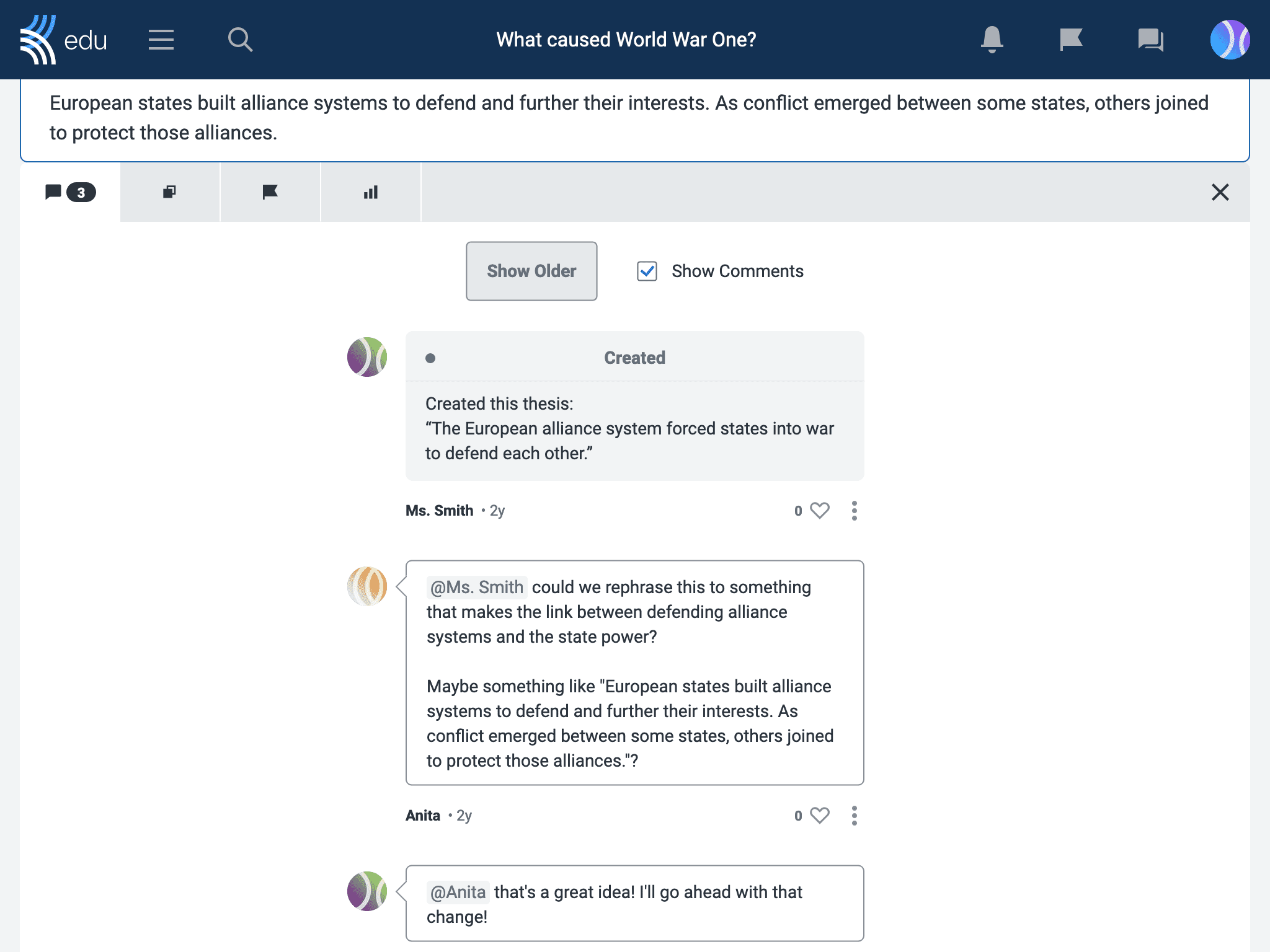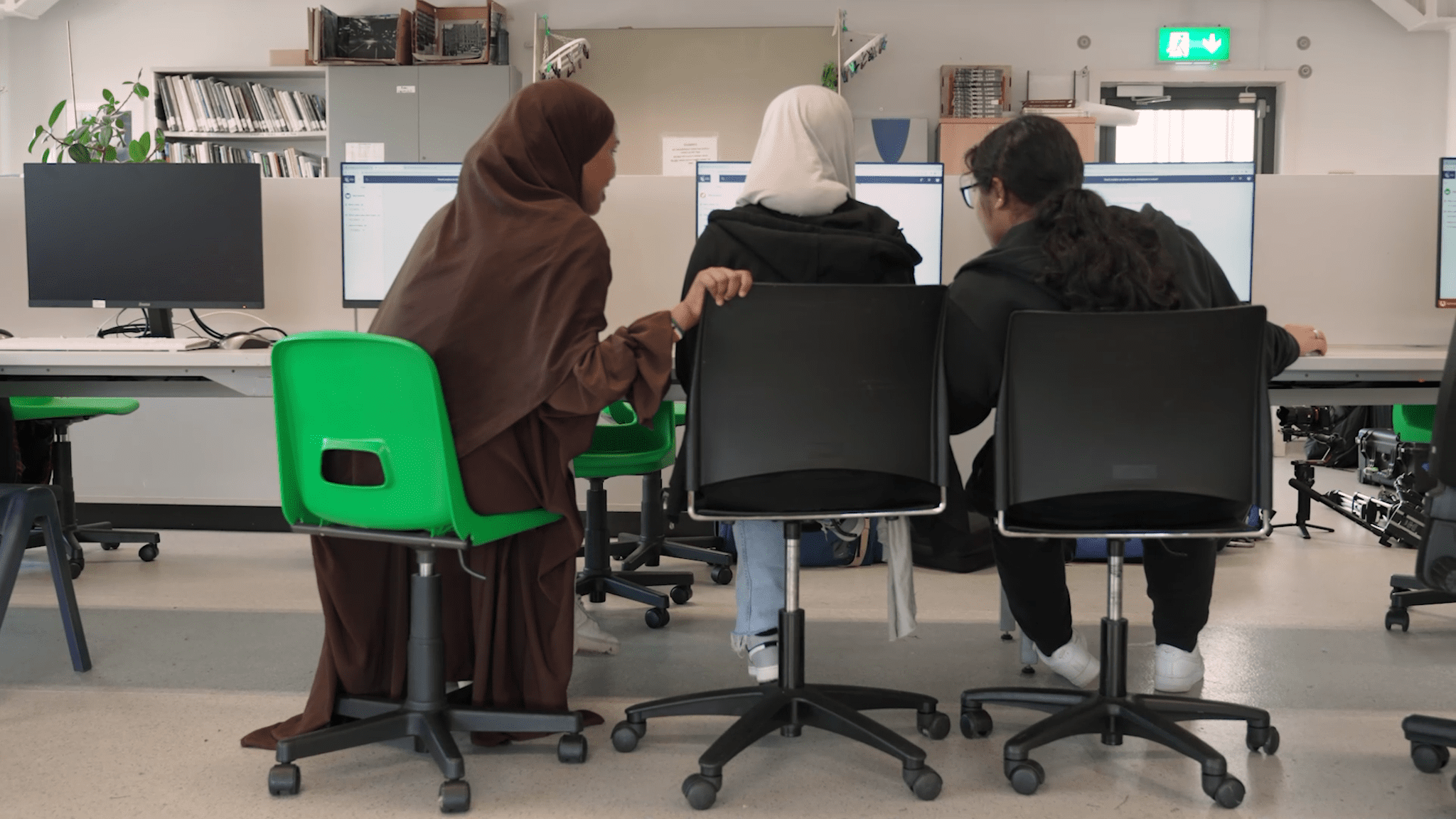A well-rounded education doesn’t just prepare students for exams, further education, and future employment — it also gives them the skills to navigate personal and social challenges. Advocates of social-emotional learning (SEL) note that these practices can be integrated across subject areas.
If you regularly hold class discussions with your students, then chances are you’re already incorporating at least some of CASEL’s five key competencies: self-awareness, self-management, social awareness, relationship skills, and responsible decision-making. Let’s take a deeper look at how you can use class discussions, including those on Kialo Edu, to advance these crucial skills.
How class discussions develop social-emotional learning competencies
1. Class discussions cultivate self-awareness and self-management
When students express themselves in class discussions, they develop their sense of self-awareness. By linking their thoughts, values, and emotions together to express a considered opinion on a topic, they are cultivating an identity within the context of a safe and supportive classroom environment. At the same time, it’s an opportunity for self-reflection and personal growth when students have their views challenged by their peers.
In setting out a clear framework for class discussions, educators encourage the important skill of self-management among students. You can create a culture where students know that their thoughts are valued, and at the same time, they learn to value others’ thoughts.

When using Kialo Edu to hold discussions, you can clearly set out expectations for how students participate by adding them to the Background Info or posting them in the Discussion Chat.
2. Class discussions promote social awareness
The purpose of class discussions is not that everyone will agree — in fact, that might make for a rather boring exercise! When students are encouraged to understand the reasons why others might hold opposing points of view, they are cultivating a sense of social awareness. Respectful disagreements are opportunities to highlight the validity of different viewpoints and an opportunity for empathy building.
As a facilitator, you can also model this behavior by showing a willingness to change your mind based on student contributions. This has the added benefit of showing students that their participation is valued and worthwhile.
Social awareness is particularly important in culturally diverse learning environments, and modeling and promoting understanding of different experiences and backgrounds builds a more inclusive classroom. When you’re discussing culturally sensitive topics in a Kialo discussion, you can always assign students the Suggester role. This lets you check what they’ve written before it is visible to the whole class.
3. Class discussions build communication and relationship skills
As students are able to practice expressing themselves thoughtfully and manage their emotional responses, they work to foster healthy relationships with their classmates. Students who practice active listening and communicating are better equipped to handle the collaborative aspects of education and employment when they are older. Not only that, they’ll also be able to better handle the dynamics of their interpersonal relationships throughout their life.
Holding breakout discussions with randomized groups builds relationships between classmates who might not usually spend time together. On Kialo Edu, you can easily clone a discussion to create multiple versions, then put students into Teams to foster collaboration.

4. Class discussions model responsible decision-making
You can give students ownership over their learning by having them collectively decide on some portion of the content, activities, or forms of assessment in your class. When you give students practical choices and a chance to deliberate with each other, you foster a sense of agency and a consciousness of the results of their decisions. When you use Kialo Edu for a practical discussion like this, have students vote on claims to see the results of their choices.
In the case of theoretical discussions, students are still practicing essential aspects of responsible decision-making: demonstrating open-mindedness, making reasoned judgments, and identifying problems and potential solutions. Thinking critically about issues — from the personal to the global scale — can give students the tools to assess problems rationally and to turn an eye towards the potential impacts of a given action.
One way to hone this skill is to hold a debate on a complex ethical issue without providing a simple black-and-white solution. Rather, by asking students to provide some potential approaches, you demonstrate that they have the capacity to affect change and tackle problems.
Social-emotional learning discussion topics on Kialo Edu
At Kialo Edu, we have ready-to-go discussion templates that cover important debate topics around social-emotional learning. Whether you choose to hold these discussions with your students in person or asynchronously, these topics are certain to rouse strong opinions in your students!
Social-emotional learning activities for elementary students
For younger students, you can practice the skills outlined above while discussing topics such as whether “mental health days” should be allowed, the importance of privacy for children, or the morality of owning pets.
1. Should we have “mental health days”?
2. Do children need privacy?
3. Is it immoral for people to own pets?
Social-emotional learning activities for middle and high school students
For older students, we have discussion templates on a range of important issues, such as whether trigger warnings should be required in schools, whether people should change their vocabulary to refer to oppressed groups, or whether 18-year-olds should be considered adults.
1. Should there be trigger warnings in school?
2. Should we change our vocabulary for referring to oppressed groups?
3. Does turning 18 really mean that you’re an adult?
Working to develop well-rounded, socially and emotionally intelligent students is truly a noble goal, and we hope you have found something in this article that will aid you in pursuing it. If you did, we’d love to hear from you — you can find us on social media, or contact us directly at feedback@kialo-edu.com.

